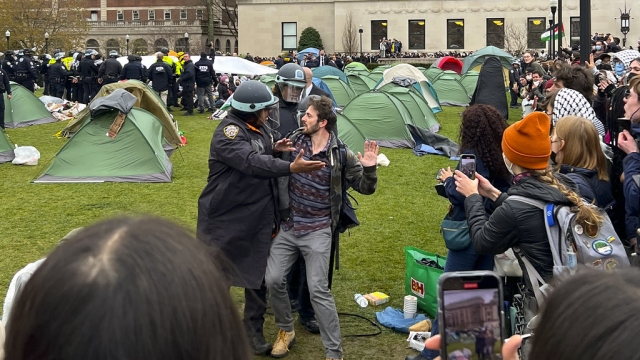Columbia University in New York is holding classes virtually Monday in response to the ongoing pro-Palestinian protests that continue to engulf the Ivy League campus. University officials said the move was in an effort to "deescalate the rancor" over the Israel-Hamas war in Gaza and address security concerns on campus as the Jewish holiday of Passover begins.
"I understand that many are experiencing deep moral distress and want Columbia to help alleviate this by taking action," University President Nemat "Minouche" Shafik said in a statement. "We should be having serious conversations about how Columbia can contribute. There will be many views across our diverse community about how best to do this and that is as it should be. But we cannot have one group dictate terms and attempt to disrupt important milestones like graduation to advance their point of view."
SEE MORE: Columbia president rebuts claims she let school become hotbed of hate
Protests broke out on Columbia's Manhattan campus last week as Shafik was set to testify at a Congressional hearing regarding the university's response to antisemitism and what phrases used by activists would be considered harassment. But what began as a protest calling for Columbia to divest from financial interests in corporations tied to Israel ended in clashes with police.
Authorities began arresting dozens of protesters Thursday after an encampment had formed on the university's South Lawn. Columbia said the group of over 100 people were notified "numerous times" that they would be suspended if they did not vacate the area, and said the participants were trespassing after the university's president ordered they be removed.
SEE MORE: Why pro-Palestinian demonstrations are popping up on college campuses
Divisive tensions have gripped American universities large and small since the Oct. 7 Hamas terrorist attack in Israel that sparked the war.
Dozens of protesters were arrested at Yale on Monday for trespassing.
Social media, combined with the social justice movements of the past several years, may be helping supporters of Palestinians organize in ways never seen before.
At Columbia, Shafik said a group of campus officials will come together and discuss ways to bring "this crisis" to an end.
"That includes continuing discussions with the student protestors and identifying actions we can take as a community to enable us to peacefully complete the term and return to respectful engagement with each other," said Shafik.
However, the division is not just a problem impacting student relations on campus. It's impacting the university's finances, too.
Robert Kraft — a Columbia University graduate — is founder of the Foundation to Combat Antisemitism and owner of the NFL's New England Patriots. As one of Columbia's largest donors, Kraft announced Tuesday that he will no longer be giving any money to his alma mater until more is done to quell the protests.
"I am no longer confident that Columbia can protect its students and staff and I am not comfortable supporting the university until corrective action is taken," Kraft said in a statement. "It is my hope that Columbia and its leadership will stand up to this hate by ending these protests immediately and will work to earn back the respect and trust of the many of us who have lost faith in the institution."
Kraft served as a trustee to Columbia from 1992 to 2004 and has donated more than $18 million to the university, according to his foundation. That includes more than $9 million to build the Kraft Center and the Robert K. Kraft Family Center for Jewish Student Life on the Columbia University campus.
Trending stories at Scrippsnews.com



